"Trouble with the Connections": J R and the "End of History"
Benjamin Bergholtz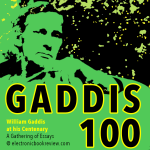
Benjamin Bergholz provides a detailed description of the neoliberal hellscape prophesized in J R. Bergholz identifies a dialectical relationship between our necessary failure as readers to fully comprehend the full details of J R's world, and the historical developments—mainly, the "end of history"—that drive this failure. He asks, how might Gaddis’s decision to impair the reader’s "ability to see what is happening" in the world of his novel help us better engage with "what is happening" in the world outside of it?
Vaihinger’s Not So Fleeting Presence: Gaddis, Ballard and DeLillo
John Soutter
Traces of Vaihinger appear in Gaddis’s first novel, The Recognitions. But what of the rest of his corpus? John Soutter explores Vaihinger's influence on Gaddis.
The Specter of Capitalism
Joseph Conte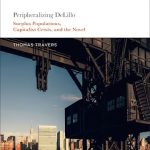
In his review of Thomas Travers' book "Peripheralizing DeLillo", Conte explores the thematic undercurrents of capitalism and its discontents across Don DeLillo's oeuvre.
Infopower and the Ideology of Extraction
Stephen Paur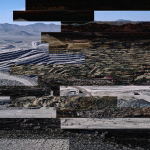
By engaging with Colin Koopman's work on the politics of information, Stephan Paur has a look at the technologically sophisticated ways that human beings are now at the mercy of our datasets. Rather than inhabiting a physical, populated place and taking part in communities, “the informational person” is increasingly outsourced into such things as birth certificates, personality profiles, racialized credit and other extractive ideologies.
Off Center Episode 7: Computational Narrative Systems and Platform Studies with Nick Montfort
Scott Rettberg, Nick Montfort
Scott Rettberg, director of the Center for Digital Narrative (CDN), in conversation with Nick Monfort, who is leading the CDN's Computational Narrative System's research node.
Writing in Flux
Hanjo Berressem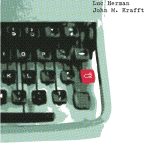
Little is know about the famously private Thomas Pynchon, but can we learn anything from an early manuscript of V.? Hanjo Berressem reviews Becoming Pynchon by Luc Herman and John M. Krafft.
Gaddis-Knowledge After the “Very Small Audience” Era: Introduction to the Special Issue on “William Gaddis at his Centenary”
Ali Chetwynd
Ali Chetwynd's introduction to the Gaddis centenary gathering on ebr.
New Directions for Gaddis Scholarship
Steven Moore
A talk given on October 20th 2022 at the William Gaddis Centenary Conference at Washington University St Louis. The version presented here is the talk as delivered, with minor edits only for clarity on the page and standardized grammar. Steven Moore prefers to leave the talk as a document of its original presentation, rather than changed into an academic article with the attendant scholarly apparatus of footnotes, works cited, and so on.
Futures of Gaddis Studies: Visions for the Next 100 Years
Tom LeClair, Victoria Harding, Crystal Alberts, Anja Zeidler, Gregory Comnes, Tim Conley, Brigitte Félix, Rone Shavers, Joseph Tabbi
We asked our contributors a set of simple questions: what do you think Gaddis Studies has best covered already, what do you think are its prospects for the future, and what future avenues would you like to see explored?
Off Center Episode 6: Gendered AI and Editorial Labour in Digital Culture with Lai-Tze Fan
Scott Rettberg, Lai-Tze Fan
Scott Rettberg, director of the Center for Digital Narrative (CDN) is joined by Lai-Tze Fan to discuss gendered AI assistants and the invisible labor involved in editorial work.
Expanding the Algorithm
Daniel Punday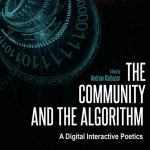
Daniel Punday reviews Andrew Klobucar’s edited collection of essays, The Community and the Algorithm: A Digital Interactive Poetics.
Off Center Episode 5: AI, Computational Creativity, and Media Production with Drew Keller
Scott Rettberg, Drew Keller
Drew Keller, Microsoft employee and graduate of the Digital Culture program at the University of Bergen joins Scott Rettberg to talk about the potential role of AI in our media production. From the Jacquard loom to the PowerPoint designer, human creativity has always been intertwined with technology, but is the rapid increase in AI a revolution in the way we produce media, or just another tool?
Davin Heckman Netprov Interview
Davin Heckman, Rob Wittig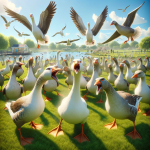
Davin Heckman on how his penchant for pranks got him to appreciate netprov and how he turned it into a versatile pedagogic tool that helps to broaden his students’ social sensibilities.
Memorial for Marjorie C. Luesebrink
Dene Grigar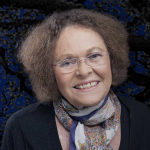
EBR would like to express thanks to Dene Grigar and Deena Larsen at Washington State University Vancouver, for organizing and hosting a memoriam for Marjorie C. Luesebrink and for letting us share the memoriam in our journal.
Who Does Your Game Play?
Hanna Hellesø Lauvli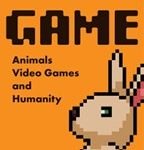
What can video games teach us about our relationship with animals? Hanna Hellesø Lauvli's review of GAME by Tom Tyler urges us to see life from the other side of the food chain.